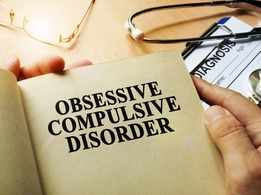01/91 in 4 COVID patients are long haulers
)

While most cases of coronavirus resolve in 3-4 weeks time, long COVID is a reality for a lot of COVID-19 patients.
Also referred to as post-COVID, the symptoms of lingering COVID symptoms have baffled medical minds and recovered patients. It can last for several weeks, and impact recovery in the long run.
02/9Long COVID can affect anyone
)

What's more shocking is that the symptoms can strike people who have had even a mild brush of COVID. Earlier studies have also pointed out that the presence of long COVID can also be determined by the symptoms patients often develop in the first week of infection.
We tell you about some of the most common long COVID symptoms which can disturb rehabilitative care post infection.
03/9Fatigue
)

Those who have suffered from COVID complain of experiencing fatigue and exhaustion like no other. Severe and chronic fatigue can also strike people who develop only mild or slight COVID symptoms.
Fatigue can also be resultant of the remaining viral debris post multiplication. As the body steps up to eliminate the virus, it can often end up in an overdrive and tire the system. Some even say that fatigue and exhaustion take the most time to recover after the infection. Therefore, it's important to give your body ample rest and plenty of fluids needed to vitalize it. Have a good diet and do not dive into chores just after recovery. Doing so will only make matters worse.
04/9Muscle pain and tiredness
)

Post-COVID fatigue has also been characterized by lethargy, muscle ache, pain, dullness and severe weakness and exhaustion.
Again, body pain can be resultant of heightened inflammation levels in the body, which can happen with COVID-19.
For some COVID patients, body pain and aches could also be accompanied by muscle pain, which is caused by consequent damage to the muscle fibres from the virus and abnormal tissue breakdown in the body.
05/9Lingering cough
)

A lingering viral load in the upper respiratory tract could also mean that cough, which is one of the most typical COVID symptoms, can be present for a longer time, sometimes 5-6 weeks or more.
Cough can be both dry or productive in nature (wet), exposing your respiratory tract and throat to more stress. Frequent steam inhalation, saltwater gargles, herbal teas and Vitamin-C rich diet can help you battle the persisting symptom and recover faster.
06/9Shortness of breath
)

Shortness of breath, or experiencing any sort of pain or discomfort while breathing can be a sign of COVID symptoms getting worse. For many long haulers, it could also be an issue which persists for long and impacts the quality of life.
Since COVID-19 acts down on lung functioning and puts an extra strain on the chest and lung passageways to support vital breathing, shortness of breath and chest pain can be commonly experienced. A sick, strained body will take a longer time to perform vital functions, and it could be particularly bad for someone who is susceptible to chronic lung infections and respiratory issues. For the same reason, some patients are asked to constantly monitor their oxygen levels, look for signs of trouble and use oxygen support machines like respirator and concentrators.
If you live in a polluted environment or are prone to pulmonary problems, consider limiting your outdoor exposure and engaging in strenuous activities.
07/9Brain fog
)

Brain fog, confusion, delirium are some of the common ways COVID-19 could impact your brain and make it age by at least 10 years, studies say. They also make for some of the most commonly recognized post-COVID symptoms. Why or how COVID-19 leads to a declined brain function is yet to be fully understood, but the impact could be so profound, it could actually degrade the quality of life for some with severe symptoms.
For many, brain fog and other persisting brain damage symptoms post recovery could be an indication of mental illness, which is why doctors are asserting on the importance of post-COVID checks and exercises to stimulate brain functioning.
It has also been witnessed that women are more prone to psychological distress than men.
08/9Insomnia and sleep issues
)

Another common symptom which tends to bother COVID-19 patients is insomnia or chronic sleep issues. Nearly half the recovered patients complain of the same.
Psychiatrists are also seeing a steady flow of recovered patients turning up with sleep issues, complaining of fear and panic, which in turn could result in sleepless nights.
Practising meditation, increasing intake of calming, soothing teas, getting frequent rest can make life less stressful and aid rehabilitation. Patients should consider seeking help if these issues become too common.
09/9Loss of taste/ diminished sense of smell
)

Anosmia and loss of taste are one of the most confusing COVID-19 symptoms and yet, for many who suffer from it, it can take weeks or in rare cases, months to regain this vital function.
Some patients who suffer from diminished loss of smell and taste often require care and non-pharmaceutical therapies like smell training to ‘rewire’ the brain to accurately recognize right tastes, smells and scents.









































































![[New!] Level 4 - 30 minute tempo fat-burning!
[New!] Level 4 - 30 minute tempo fat-burning!](https://static.toiimg.com/thumb/79327298.cms?width=147&height=86)













closecomments
SIGN IN WITH
FacebookGoogleEmail